- Home
- Christie Golden
Shadow of Heaven Page 4
Shadow of Heaven Read online
Page 4
CHAPTER
4
CHAKOTAY’S MOUTH HURT FROM SMILING SO MUCH. HE hadn’t realized how much he missed the little luxuries he had come to take for granted living in the twenty-fourth century. The sonic shower beat sluicing down with algae-infested rainwater hands down, and if the dinner hadn’t had the delicious flavor of fruits freshly harvested or meat roasted slowly over an open pit, at least it had been served on a table with eating implements and napkins. It didn’t hurt that he was being treated as an honored guest and feted to the nines, either.
He stepped out of the shower, the second one he’d had that day, and began to dress in the tailored, fitted clothing he was coming to realize was standard among the Alilann. Ramma the weaver had made him and Tom beautiful robes that fit well and were exquisitely comfortable. More comfortable and more attractive, truth be told, than the clothes he shrugged into now. But these felt right to him in a way that the Culilann clothes, beautiful, functional, and handmade, had not. He made sure to fasten the small gold translation device to his chest. The Culilann might have a facility with alien languages that bordered on incredible, but the Alilann, just like the Federation, had to rely on artificial means of translating language.
He had to admit, he’d enjoyed his time with the villagers of Sumar-ka. But he was glad to be among an advanced species again, with comforts that were more familiar to him. And now, he finally had a chance of locating his ship, something that would have been impossible if he had lingered in Sumar-ka. His only regret was that he had not been permitted to say farewell to the people who had become his friends, and that the Recovery team had not been able to bring Tom along, though Ezbai reassured him that a second attempt would be made immediately.
Chakotay sat on the edge of the bed—an actual bed!—and tugged on boots that had been replicated to fit his feet exactly. Rising, Chakotay surveyed himself in the mirror. He ran a hand along his clean-shaven jaw; shaving had not been possible among the Culilann. That, even more than the clean clothes and the shower and the meal, made him feel like he had finally come out of the jungle for good.
There came a soft chiming sound. “Come,” called Chakotay. When the door didn’t open, he belatedly recalled that chimes meant verbal communication. “Chakotay here,” he said.
“Commander Chakotay.” It was Shamraa Ezbai Remilkansuur’s voice. It was his Recovery team which had taken Chakotay from the village. “I apologize for interrupting you. I realize you are exhausted and were probably looking forward to retiring, but ….”
“If you need me, Ezbai, bedtime can wait,” Chakotay said with a little smile. “And actually, I was just about to take a stroll, get a little better acquainted with your command center. What’s going on?”
“We were going to do all this in the morning,” Ezbai lamented. “Your medical examination, your debriefing, everything, but the Implementer insists.”
“Ezbai, it’s all right, I really don’t mind,” Chakotay repeated, mildly amused at Ezbai’s profuse apologies.
“You are gracious, Chakotay, and it is important. I will escort you to the meeting room,” said Ezbai. Chakotay knew that it wasn’t because Ezbai didn’t trust him. It was because the Alilann command center was so vast that Chakotay couldn’t hope to find his way there alone.
In a few moments, another sound came, an unpleasant buzz. Chakotay stepped forward and the door opened. Ezbai looked awful. His pale blue skin was paler than ever and his eyes darted this way and that.
“What is it? What’s wrong?” Chakotay asked.
Ezbai opened his mouth to reply, then obviously thought better of it and shook his head. “Come on,” he said. “You’ll see. Oh, Chakotay, it’s just awful.”
And that was all Chakotay was going to get out of the distraught Interceptor. Ezbai led him through a labyrinth of gray metal. Chakotay had not been impressed with the design or décor of the place from the minute he had transported into its dry coolness from the hot, humid jungle. There was nothing here that was not simply functional. Even his room, which Ezbai assured him was the finest of the available guest quarters and usually reserved for the highest-ranking diplomats, was devoid of personality. The bed had felt comfortable when he sat on it, but there had been no decorations, no art on the walls, nothing to really set it apart.
The corridors down which Ezbai led him were utilitarian, nothing more. At first he’d thought this was a military compound, in which case the lack of decoration would make more sense. But Ezbai had assured him that while the place was a command center, it was also a place where people lived and children were raised. An Alilann city, domed and completely shut off from the natural environment of the planet’s surface. It did not feel or look like a place where children’s laughter was a welcome sound.
Chakotay was glad of Ezbai’s presence. He’d have gotten lost within a few moments on his own. Left, right, left, left, down, into a turbolift, left again—it was dizzying. Finally they reached a mammoth door, which hissed open for them.
There was a large, round, metal table in the center of the room. Approximately twenty people sat at the table, all clad in clothing identical to Chakotay’s. There were glasses, pitchers, and several bowls filled with small gray-brown nuggets of some sort. The room was octagonal and the walls were covered with eight floor-to-ceiling viewscreens. Seven of these were activated, displaying various planets, star systems, or what Chakotay presumed to be key sites on this or other planets. The eighth was ominously dark.
A very fat man sat at what was clearly the head of the table. A half-empty bowl of the gray-brown nuggets was at his elbow, and his hands were clasped in front of him. He looked extremely upset. His skin was flushed a darker blue than that of the other Alilann surrounding him, and Chakotay had a mild fear for his health.
As they approached, the man rose with not a little effort. “Implementer,” said Ezbai, “may I present Commander Chakotay of the Starship Voyager.”
“So,” wheezed the Implementer, regarding Chakotay with piggy blue eyes, “this is the one you managed to get, eh? I apologize, Commander. I understand that you had to suffer through the Culilann’s barbarous Ordeal. If Shamraa Ezbai had been doing his job correctly, you and your friend would never have fallen into their clutches in the first place.”
Beside Chakotay, Ezbai flushed blue, but said nothing. He stood rigidly straight. Chakotay felt embarrassed on his behalf.
“I’m none the worse for my Ordeal, and it was Shamraa Ezbai who did Recover me, as you pointed out. Besides, I don’t count my time among the Culilann as wasted. You have two fascinating cultures on this planet.”
There were disapproving murmurs around the table. The Implementer’s piggy eyes went cold, and Chakotay suddenly realized he had no desire to get on this man’s bad side, comical though he might be at times.
“We don’t consider what the Culilann do to be, ah, cultural,” said the Implementer. Nods of agreement went around the table this time, as if everyone else were sheep to this man’s ram. There was an expression of faint disgust on all the faces. Chakotay recognized the same contempt and hostility that Yurula, the mate of the man who had healed them, had displayed when she was talking about the Alilann. He realized that he had blundered onto a very sensitive subject, and while he could feel his own righteous anger rising at the slurs against the people who had treated him so kindly, he forced himself to smile pleasantly.
“Commander Chakotay knows of my sister,” blurted Ezbai. “We were to debrief him in the morning, but since everyone is gathered here—”
“Shamraa,” said the Implementer, sitting back down in a chair that seemed far too small to hold his great weight, “we will discuss that later. You brought Commander Chakotay here for another reason. Or have you forgotten?”
“N-no, Implementer.” Ezbai’s voice was a whisper. The big bully had him totally cowed. Chakotay decided he really, really didn’t like the Implementer.
“Please sit, Commander.” The Implementer waved a fat hand, then lowered t
he hand into the bowl. He popped a few nuggets into his mouth and chewed. “Have some articrunch,” he suggested. “These things are so tasty. And I bet you’re hungering after some real food after your time with the Culilann.”
Chakotay sat down. Ezbai slid into the seat beside him. Chakotay looked at the dry, unappetizing nuggets that were called “articrunch.” The very name quelled any hunger he might be experiencing. He thought back to the feast with which the Culilann had initiated him and Tom into their rank. Fruits picked at their ripest. Fish and birds and other meats roasted to perfection, basted with fruit juices and served with mashed roots and tubers. Sweet desserts, tangy savories, all manner of food infinitely more “real” than this bowl of brown crunchy things.
“No, thank you,” he said with exaggerated politeness. “I’m still full from dinner.”
“More for me, then,” said the Implementer, and laughed uproariously at his own joke. Halfhearted titters went around the table. Chakotay was rapidly coming to the conclusion that, aside from Ezbai, he didn’t really like any of the Alilann he had met.
His gaze fell to the table. There was a metallic rectangle embedded in the surface. As he regarded it, it hummed to life and glowed bright green.
“Please place your right hand on the tester, if you would, Commander. It won’t harm you,” the Implementer said.
“What is it?”
“It’s a way of ascertaining whether what you are telling is the truth.”
A smile twisted Chakotay’s full lips. “So, I see the Alilann have their own version of the Ordeal.” Nonetheless, he complied. He had no intention of lying to these people. The metal was warm on his hand as he placed it down. The woman sitting directly across from him activated something; he couldn’t see what, but immediately his hand began to tingle. It was not an unpleasant sensation.
The Implementer sobered. “I don’t know how much Shamraa Ezbai has told you. I wouldn’t be surprised if he hasn’t told you anything. We have a spy planted in almost every Culilann village. The one located in the village which imprisoned you—”
Chakotay couldn’t help it. “They didn’t imprison me, and the village’s name is Sumar-ka.” Even as he spoke in defense of the Culilann, Chakotay wondered who this spy could be. Soliss? He seemed sympathetic enough toward the Alilann at times. Winnif? She had appeared reconciled to the loss of her infant to the so-called Crafters, but what if it was because she knew that the infant would be rescued by the Alilann? Trima? Yurula? Ramma, the weaver? Or someone else?
The Implementer glowered at him, then continued. “Sumar-ka, then, if you will have it so. The spy in Sumar-ka is quite frankly a bit of a triumph for our side.”
“I didn’t know the Culilann and the Alilann were in conflict,” said Chakotay.
“We’re not, but there are most definitely two sides, Commander. Surely you cannot have failed to notice that. This person was planted deep, at a young age. We do not even know the spy’s gender; that is highly classified information. This person sent us a message shortly after dawn.” He nodded curtly, and one of the young men standing at attention beside the dark viewscreen tapped in a command.
In its own way, the communiqué was almost as primitive as the Culilann. There was no face, no voice, only white words scrolling across a gray screen. Chakotay saw an English translation alongside the strange letters of the Alilann language. They were fast translators, these people. Doubtless, this was to protect the spy’s identity.
Our Culil was found dead several days ago, a clear mark of a directed energy weapon on his chest.
Chakotay inhaled swiftly. Matroci, murdered?
Fortunately, or unfortunately, whoever committed the atrocity was clever enough to cover his tracks. The Culil’s domicile was filled with the smoke from the Sacred Plant, which was directly responsible for his death; the energy weapon was obviously set to only stun. No one in the village has noticed, though I think this alien Paris might suspect something.
Chakotay had his problems with the impetuous ensign, but he knew one thing for certain. If Voyager’s pilot and medical assistant had seen the mark of which the spy spoke, he’d know precisely what it meant.
Either that, or he or his companion Chakotay is the killer.
Chakotay’s grief and horror at Matroci’s murder became something more personal as every head in the room turned to regard him. He started to speak, but the Implementer waved him to silence. There was more to the message.
Chakotay disappeared the night of Matroci’s murder, which makes me very suspicious. They could be the ones killing the Culils, wandering from village to village, place to place. They had the weapons, though I think it odd that Chakotay and Tom would have been able to find where I had hidden them, used them, and then returned them.
You must let me know if Chakotay was Recovered or if he fled on his own. And if the former, then why did you not take Tom Paris? I am in danger now. Please advise.
They are only Culilann, but they are not beasts to be slaughtered so. Matroci was a voice of calm reason in this village, and his death is a setback for everything save an increase in hostilities. Was this authorized? I repeat, was this authorized? If not, and if Chakotay was indeed Recovered, then, Implementer, you have a rogue on your hands, and no one is safe.
It was signed “The Silent One.”
Chakotay stared as the words on the screen faded. Before he could speak, the woman across from him said, “His reactions were genuine. He knew nothing of the death.”
“You killed Matroci?” the Starfleet commander demanded, ignoring the woman.
The Implementer looked unhappy. “It was not authorized. We may loathe the Culilann, but we are not murderers. The worst of it is, this is not the first time a Culil has been killed in one of the Culilann villages. Over the last six months, five Culils have died under mysterious circumstances.”
“During Recoveries?” Chakotay asked.
“Once or twice, as with this Matroci. Other times, no. I brought you here to ask for your help, Commander. These murders are a bad thing for us. They could stir up resentment against us among the Culilann. Tell us everything you learned during your time with them.”
Chakotay regarded the Implementer. “I don’t know that the answers lie with the Culilann. It sounds like an Alilann, or a group of them, have been acting on their own and killing the Culils. We should start an investigation here.”
“And we will, don’t worry,” said the Implementer. “But first I would like to start an investigation of you.” He leaned forward, his blue eyes penetrating. “You and your friend didn’t arrive in the normal fashion, or else even Shamraa Ezbai would have been able to Intercept you properly. We saw no ships, heard no communications—you suddenly were just here, on our planet. How did you do this? And why?”
“It’s a long story,” Chakotay warned.
“We have nothing but time,” the Implementer answered frostily.
So Chakotay started at the very beginning, trying to condense years of adventures into a few words. He explained how they had ended up in the Delta Quadrant, his alliance with Captain Janeway. He spoke of their first encounter with Telek R’Mor, and how bitter it was not to be able to transport home when it seemed as though the opportunity had finally arisen. He went into greater detail about the more recent events, telling them about the Shepherds, the Romulans, and the mutated dark matter which had such deadly, devastating results.
The more he spoke, the more rapt his audience became. At one point, the Implementer seemed to have completely forgotten about his beloved articrunch and leaned forward, barely blinking. Even the woman who was supposed to be monitoring him for deception seemed to forget her task and simply stared at him. Father would be so proud of me, Chakotay thought, amused. I’ve become a storyteller.
Finally he came to the part about finding Khala. “You see!” interjected Ezbai, unable to contain himself. “Khala is with Chakotay’s people, and he and Tom are here. We’ve got to help him find his ship!”
For the first time, the Implementer seemed as excited as Ezbai. “Yes, we do. We need to learn more about this dark matter as well. Perhaps we too have encountered some, and aren’t even aware of it.” A thought seemed to occur to him. “It could be that this is what is motivating the killers. Dark matter renders one’s judgment unreliable, yes?”
Chakotay thought of Neelix, attacking Telek with a kitchen knife. “Sometimes,” he said. He did not say what he thought in his heart: that someone among the Alilann, or a group of them, had simply decided that they hated the Culilann enough to kill their spiritual leaders. He would like to be wrong, would like to blame it on the dark matter; but he was all too aware that sometimes evil existed quite well without any assistance.
The Implementer nodded, as if satisfied. “Well, problem solved. It’s clear to me that this dark matter is the culprit.”
Chakotay couldn’t help it. “Dark matter can’t wield directed energy weapons,” he said. “We need to stop these killers before they strike again.”
“Of course,” said the Implementer, nodding as if the two of them were in perfect agreement rather than conflict. “We need to concentrate on being able to detect this dark matter. That will stop the killing.”
“Will it?”
“Chakotay, you are not familiar with our people. Perhaps your species has problems that routinely result in murder and chaos. We do not. The Alilann and Culilann have existed side by side for centuries with only the occasional minor conflict. We’re not killers by nature. It’s plain to me that it is the dark matter that is affecting the killer, or killers. And you will help us detect it, Chakotay.”
“I’m pleased to be of what assistance I can,” said Chakotay, “but I’m no physicist or engineer. Your efforts would be better spent trying to find my ship. I’m certain our crew has made great strides in my absence, and they have the sphere of the Shepherds as well.” He spoke no more of his fears. There was no point. It was obvious the Implementer was too confident in the peaceful nature of his people and had seized upon the dark matter as the scapegoat.

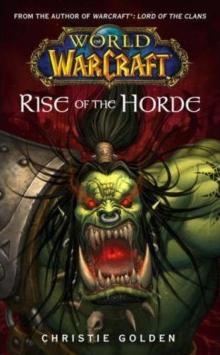 Rise of the Horde
Rise of the Horde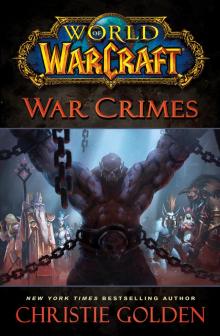 World of Warcraft: War Crimes
World of Warcraft: War Crimes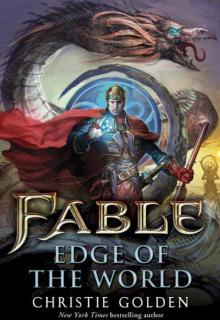 Fable: Edge of the World
Fable: Edge of the World Homecoming
Homecoming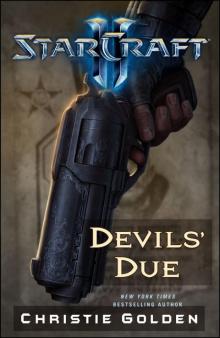 StarCraft II: Devil's Due
StarCraft II: Devil's Due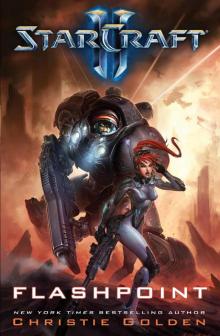 Starcraft II: Flashpoint
Starcraft II: Flashpoint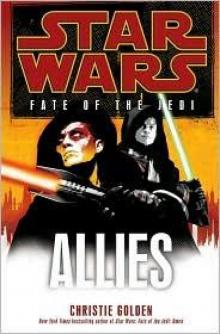 Allies
Allies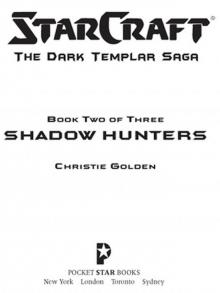 Shadow Hunters
Shadow Hunters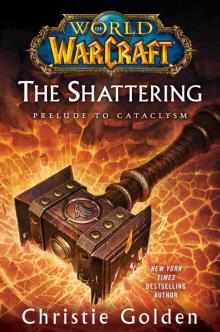 The Shattering: Prelude to Cataclysm wowct-1
The Shattering: Prelude to Cataclysm wowct-1 STAR TREK: VOY - Homecoming, Book Two - The Farther Shore
STAR TREK: VOY - Homecoming, Book Two - The Farther Shore King's Man and Thief
King's Man and Thief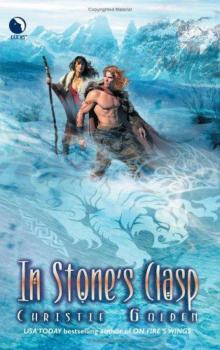 In Stone's Clasp
In Stone's Clasp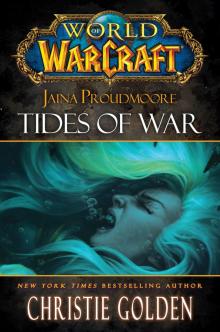 Jaina Proudmoore: Tides of War
Jaina Proudmoore: Tides of War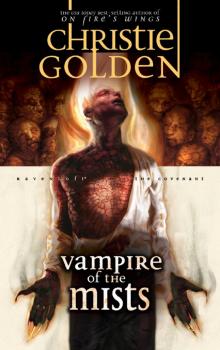 Vampire of the Mists
Vampire of the Mists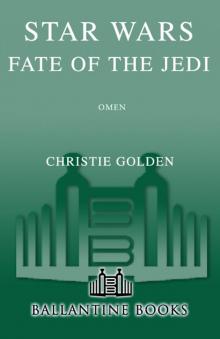 Star Wars: Fate of the Jedi II: Omen
Star Wars: Fate of the Jedi II: Omen King's man and thief cov-2
King's man and thief cov-2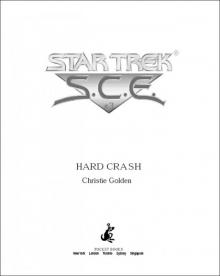 Star Trek
Star Trek StarCraft: Dark Templar: Twilight
StarCraft: Dark Templar: Twilight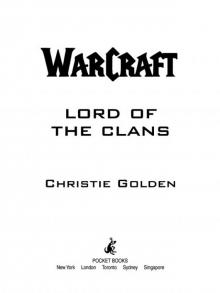 Lord Of The Clans
Lord Of The Clans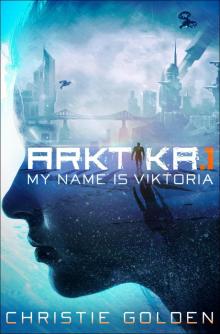 ARKTIKA.1 (Short Story)
ARKTIKA.1 (Short Story)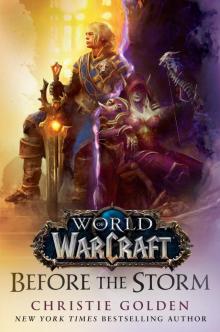 Before the Storm
Before the Storm STAR TREK: VOY - Homecoming, Book One
STAR TREK: VOY - Homecoming, Book One Shadow of Heaven
Shadow of Heaven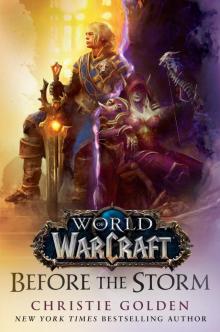 Before the Storm (World of Warcraft)
Before the Storm (World of Warcraft)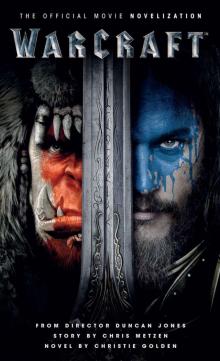 Warcraft Official Movie Novelization
Warcraft Official Movie Novelization Flashpoint
Flashpoint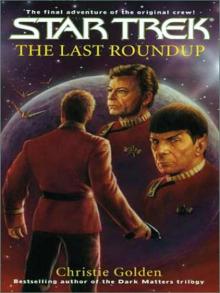 STAR TREK: The Original Series - The Last Roundup
STAR TREK: The Original Series - The Last Roundup On Fire’s Wings
On Fire’s Wings Spirit Walk, Book One
Spirit Walk, Book One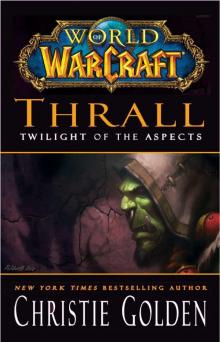 Thrall Twilight of the Aspects
Thrall Twilight of the Aspects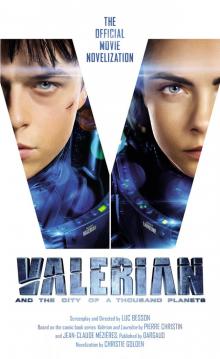 Valerian and the City of a Thousand Planets
Valerian and the City of a Thousand Planets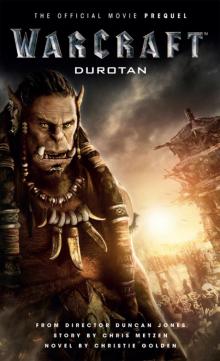 Warcraft
Warcraft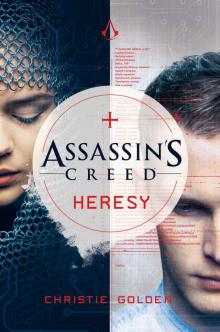 Assassin's Creed: Heresy
Assassin's Creed: Heresy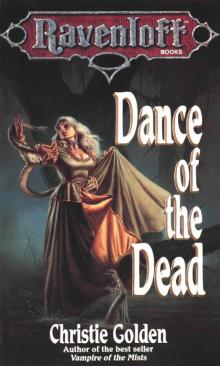 Dance of the Dead
Dance of the Dead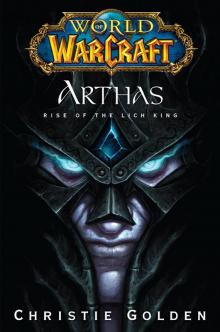 Arthas: Rise of the Lich King wow-6
Arthas: Rise of the Lich King wow-6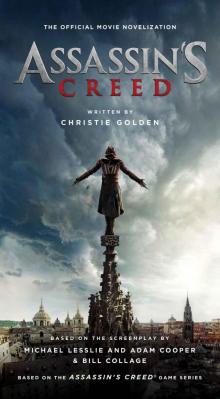 Assassin's Creed: The Official Movie Novelization
Assassin's Creed: The Official Movie Novelization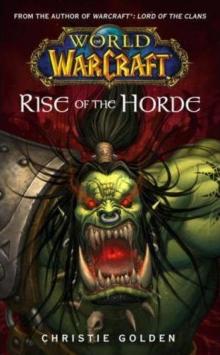 Rise of the Horde wow-2
Rise of the Horde wow-2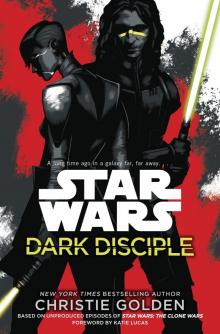 Dark Disciple
Dark Disciple Ghost Dance
Ghost Dance The Shattering
The Shattering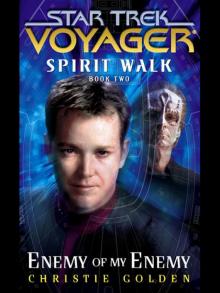 Spirit Walk, Book Two
Spirit Walk, Book Two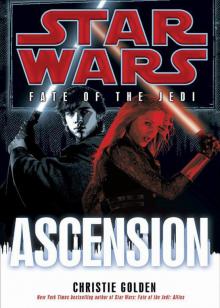 Star Wars: Fate of the Jedi: Ascension
Star Wars: Fate of the Jedi: Ascension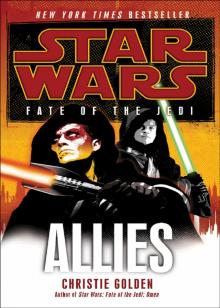 Star Wars: Fate of the Jedi V: Allies
Star Wars: Fate of the Jedi V: Allies The Enemy Within
The Enemy Within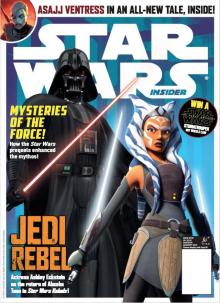 Kindred Spirits
Kindred Spirits The Farther Shore
The Farther Shore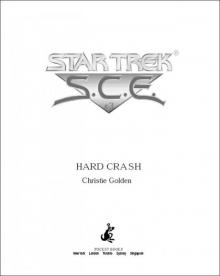 Star Trek: Hard Crash (Star Trek: Starfleet Corps of Engineers Book 3)
Star Trek: Hard Crash (Star Trek: Starfleet Corps of Engineers Book 3) Twilight
Twilight